Discover Conservation Careers Podcast
Conservation Careers Podcast

Conservation Careers Podcast
Author: Conservation Careers
Subscribed: 311Played: 7,935Subscribe
Share
© Copyright 2025 Conservation Careers Ltd
Description
Nick Askew from Conservation Careers uncovers what it's like to work in wildlife conservation. He explores how to get a conservation job, and discusses the latest industry news, by speaking to professional conservationists who share their career stories and advice.
So if you want the inside scoop on the life of a professional conservationist and their industry, are feeling lost in your conservation job hunt and need some direction, or wanting to switch careers into conservation but don't know where to start - this is the podcast for you!
Conservation jobs, conservation volunteering, conservation internships, conservation careers, conservation news, conservation stories.
Check us out at conservation-careers.com to find the most conservation jobs and the best conservation careers advice.
So if you want the inside scoop on the life of a professional conservationist and their industry, are feeling lost in your conservation job hunt and need some direction, or wanting to switch careers into conservation but don't know where to start - this is the podcast for you!
Conservation jobs, conservation volunteering, conservation internships, conservation careers, conservation news, conservation stories.
Check us out at conservation-careers.com to find the most conservation jobs and the best conservation careers advice.
150 Episodes
Reverse
Dr Marisa Tellez knew from a young age that she was destined to work with the world’s apex predators—particularly crocodiles. While her peers played with dolls, she immersed herself in books, documentaries, and wildlife centres, determined to one day turn her fascination into action.In this episode, we sit down with Dr Tellez, Executive Director of the Crocodile Research Coalition, to explore her remarkable journey from the suburbs of Los Angeles to the lagoons of Belize. Along the way, we uncover how her early love for reptiles led her into parasitology, science communication, and community-led conservation.Marisa shares how local attitudes toward crocodiles in Belize have transformed through education and engagement, and we dive into what it’s really like to live and work among these often-misunderstood creatures. We also talk about threats facing crocodilians and what it takes to build a career in conservation as a woman, a leader, and a lifelong learner.This is a podcast about passion, persistence, and predators—and why building empathy for crocodiles might just help save them.
What happens when you stop fearing sharks — and start listening to them?In this inspiring episode, we dive into the extraordinary world of Cristina Zenato – a trailblazing shark behaviorist, cave explorer, and professional diver who has spent over three decades in the Bahamas.As Director of Training for the Underwater Explorer Society and Founder of the non-profit People of the Water, Cristina has dedicated her life to understanding and protecting the ocean's most misunderstood creatures.Join us as we explore her fascinating journey from her roots in Italy and the Congo to the depths of underwater caves and the intimate world of sharks. Cristina shares powerful stories of connection, resilience, and redefining success, while offering rich advice for anyone dreaming of a career in marine conservation.Whether you're intrigued by the emotional intelligence of sharks, curious about cave diving, or navigating your own conservation career path, this episode is packed with insight, heart, and raw inspiration.Enjoy.
Dr Dave Johnston, Director of Professional Development at the Wildlife Conservation Society, shares why education is essential to conservation. In this episode, we explore how zoos and aquariums scale conservation impact, how Dave built a fulfilling career through teaching, and what effective conservation education really looks like.We explore:Why zoos and aquariums are ideal hubs for conservation learningHow Dave pivoted from animal care to conservation educationWhat makes professional development effectiveWhy empathy, storytelling and respect are critical in engaging learnersAnd how you can start or grow your career in conservation educationIt’s an energising, thoughtful and hopeful conversation.🔗 Learn more about WCS: https://www.wcs.org 🎓 Explore Conservation Careers: https://www.conservation-careers.com
In this episode, Dr Stephen Green joins Nick Askew to share the story behind the MSc Conservation Project Management – a skills-based master’s programme co-created by Newquay University Centre and Conservation Careers.Together, they reflect on the first year of delivery, the importance of employer-aligned training, and the transformative impact of the Conservation Careers Kickstarter course. It’s a practical, personal and inspiring look at how to build careers – and courses – that make a difference.Find out more here - https://www.cornwall.ac.uk/courses/msc-conservation-project-management/
Today we’re joined by Sara Kenny – Communications and Marketing Manager at Biodiversify – for a rich conversation on the power of messaging, the art of communications strategy, and why brand matters in conservation.We dig into Sara’s journey from zoology and human rights into charity communications, and now, leading communications and marketing for one of the UK’s most distinctive biodiversity consultancies. She reflects on brand-building, crafting effective messages, collaborating with corporates, and the role of hope in tackling environmental issues.We also explore careers advice for people wanting to work in conservation communications—what skills matter most, how AI is reshaping the landscape, and why it’s okay to have a squiggly career.It’s a practical, honest, and empowering episode about the human side of making nature recovery happen. Enjoy!
What can three decades in one wild place teach us about conservation?In this episode, we sit down with Craig Ralston - Natural England Senior Reserve Manager at Yorkshire’s Lower Derwent Valley National Nature Reserve - to explore his remarkable 30-year journey of restoring landscapes, inspiring communities, and navigating change.Craig shares his reflections on the importance of long-term thinking in conservation, and why reconnecting people with place is at the heart of his work. Whether you’re just starting out or decades in, this episode offers powerful insights into what it means to hold the line for nature.It’s a reflective, real-world, and deeply inspiring conversation.Enjoy.🟢 Subscribe to the Conservation Careers Podcast for more inspiring interviews: https://www.conservation-careers.com/podcast/📌 Learn more about careers in conservation: https://www.conservation-careers.com/🔖 Timestamps: 00:00 – Intro 02:10 – Craig’s journey into conservation 08:30 – Three decades in the Lower Derwent Valley 18:15 – Career lessons and managing teams 35:00 – Hope, people, and place 42:10 – Craig’s advice for conservationists🔗 Useful Links: • Lower Derwent Valley NNR – Natural England • Conservation Careers Courses🎧 Listen on all podcast platforms. 👍 Like, Comment, and Subscribe for more inspiring conservation stories.🎯 Tags: #ConservationCareers #CraigRalston #NatureRecovery #WildlifeConservation #Burnout #Rewilding #NatureRestoration #ConservationPodcast #Wetlands #ConservationJobs #ConservationSuccess #CareerSwitchers #EnvironmentPodcast
What if we gave as much love to insects as we do elephants?In this episode, we’re joined by Dr Kate Umbers – Senior Lecturer in Zoology at Western Sydney University and Managing Director of Invertebrates Australia – for a passionate, perspective-shifting conversation about the beauty and importance of bugs.Kate shares why insects deserve a central place in conservation, the inspiring work of the Insect Conservation Lab, her career pivot from policing to zoology, and her honest reflections on motherhood, motivation, and choosing hope in conservation.From Glowworms to Christmas Beetles to the mighty Bogong Moth, this episode is packed with quirky facts, emotional truths, and practical career advice.If you’ve ever felt overlooked, underfunded, or uncertain on your conservation journey – this one’s for you.
How systemic transformation, inclusive leadership, and a vision for a nature-positive future are shaping WWF’s global conservation strategy, with our guest Daudi Sumba.What does it take to lead one of the world’s most influential conservation organisations during a time of ecological crisis and transformation? And how do you align 100+ countries, thousands of staff, and a 64-year legacy behind a single, shared vision for 2030?Today’s guest is Daudi Sumba, Chief Conservation Officer at WWF International. With over 30 years of experience across Africa’s conservation and development sectors—and senior roles at Conservation International, The Nature Conservancy, and the African Wildlife Foundation—Daudi is now helping steer the global strategy of WWF as it works to halt and reverse biodiversity loss by 2030.In this episode, we explore the ambitious WWF Roadmap to 2030—including six global goals focused on biodiversity, climate, food systems, finance, and locally-led conservation. We dive into the concept of systemic change, the shift to inclusive conservation, and the bold leadership required to drive outcomes at scale.Daudi also shares his own career story—from his unexpected beginnings in economics to investing in lifelong learning to grow as a leader. He speaks passionately about the value of natural resources in Africa’s development, the role of hope in driving impact, and why there’s space in conservation for every kind of skill—even politics.It’s a big-thinking, deeply inspiring, and leadership-packed conversation.Enjoy!🔗 Learn more: https://wwf.panda.org 🎧 Listen to more episodes: https://www.conservation-careers.com/podcast 🧭 Hosted by Nick Askew | Conservation Careers#DaudiSumba #WWF #ConservationLeadership #WWF2030 #SystemicChange #AfricanConservation #SustainableDevelopment #NaturePositive #ConservationCareers
In this episode of the Conservation Careers Podcast, we meet Beryl Makori, Conservation Manager at The Pangolin Project in Kenya.Beryl shares the remarkable story of rediscovering Kenya’s giant ground pangolin—a species once thought extinct in the country—and the urgent efforts now underway to protect it. From community engagement and ranger patrols to habitat leases and landowner partnerships, The Pangolin Project is racing to secure the last remaining habitat of this elusive and endangered mammal.We also dive into Beryl’s inspiring personal journey—from being known as the “Bat Lady of East Africa” to leading a passionate grassroots team working at the frontlines of conservation.What you'll learn:Why pangolins are the world’s most trafficked mammalHow the giant ground pangolin was rediscovered in KenyaWhat it takes to build conservation trust with local communitiesCareer advice for aspiring conservationistsThe power of persistence and passion in wildlife conservationLearn more about The Pangolin Project: https://www.thepangolinproject.org/Like, comment and subscribe for more inspiring conservation stories! #PangolinConservation #BerylMakori #ConservationCareers #WildlifePodcast #GiantGroundPangolin #CommunityConservation #EastAfrica #BatLady #WomenInConservation #ConservationPodcast
How One Caribbean Biologist is Shaping the Future of Conservation From Cambridge to the Tropics.In this episode of the Conservation Careers Podcast, we speak with Dr Howard Nelson—Lecturer in Conservation Leadership at Fauna & Flora International and the University of Cambridge.Howard brings over 30 years of experience across the Caribbean and the UK, working in government, NGOs, and academia. We dive into his work teaching the next generation of conservation professionals and discuss his journey from managing jaguar habitat in Trinidad to shaping conservation policy and leadership in Cambridge.Topics covered:What is conservation leadership?Lessons from 30+ years in field ecology and policyThe science-policy interface in small island statesAdvice for career switchers and aspiring conservationistsThe importance of communication and diversity in conservation#ConservationLeadership #HowardNelson #FaunaAndFlora #ConservationCareers #WildlifeBiologist #GlobalSouthVoices #CambridgeUniversityLinkshttps://www.cl.geog.cam.ac.uk/
How Nick Bubb Combines Fundraising, Empowerment, and a Life of Adventure to Guide One of Africa’s Leading Conservation Charities, Tusk.What’s it like to lead one of Africa’s most influential conservation charities? How do you support grassroots leaders across a continent while balancing fundraising, strategy, and your own wellbeing? And how can a mid-career pivot lead to purpose and impact in conservation?Today’s guest is Nick Bubb, Chief Executive of Tusk Trust. With a background in engineering, ocean racing and finance, Nick brings a unique perspective to conservation leadership.In this episode, we explore Nick’s approach to leading Tusk: supporting small, high-impact conservation projects, championing ranger welfare, and shaping a collaborative future for African wildlife protection. We also dive into his career journey, lessons from his time at Fauna & Flora International, the importance of career switchers in the sector, and how to handle the pressure of leading with purpose.It’s a generous, inspiring, and mission-driven podcast.Enjoy!https://tusk.org/
How Conscious Explorer is Transforming Travel Into a Powerful Force for Conservation and Community Development, With Daniel Kaul.Can travel be more than just an escape? How can tourism actively contribute to conservation and community well-being? And what does ethical, sustainable travel truly look like?Today’s guest is Daniel Kaul, founder of Conscious Explorer and Natucate, two pioneering organisations at the intersection of ecotourism and conservation. With a passion for ethical travel, Daniel has spent years designing experiences that allow travellers to explore the world while making a meaningful impact on nature and local communities.In this episode, we dive into the concept of conscious travel—how it works, what responsible tourism looks like, and the challenges and opportunities in the ecotourism sector. Daniel also shares his entrepreneurial journey, insights into building ethical travel businesses, and practical advice on how travellers can make informed choices that support conservation efforts.It’s a thought-provoking, industry-changing and solutions-driven podcast.Enjoy!https://conscious-explorer.com/
Hi there. Nick here from Conservation Careers, and welcome to the podcast.What’s it like to study and protect turtles in the stunning waters of Egypt’s Red Sea? How can citizen scientists and local communities play a key role in marine conservation? And what are the biggest threats facing sea turtles today?Today’s guest is Micol Montagna, biologist and project coordinator at TurtleWatch Egypt 2.0. Micol has dedicated her career to marine conservation, using citizen science and innovative research to monitor and protect turtles along Egypt’s Red Sea coast.In this episode, we explore the vital role Egypt plays in global turtle conservation, how TurtleWatch Egypt identifies and tracks individual turtles, and the importance of community engagement in marine protection. Micol also shares her career journey, insights into working in conservation, and advice for aspiring marine biologists.It’s an inspiring, hands-on, and action-focused podcast.Enjoy!---Linkshttps://turtlewatchegypt.net/
How Career Coach John Tarnoff Helps Professionals Navigate Change, Find Purpose, and Build Meaningful Careers in Conservation and Beyond.What if midlife wasn’t a crisis but an opportunity? How can professionals transition into conservation careers later in life? And what does it take to reinvent yourself for a career with purpose?Today’s guest is John Tarnoff, career coach, author, and speaker specializing in mid-career transitions. After spending decades in Hollywood as a film executive and producer, John made a dramatic career pivot and now helps professionals navigate career change with confidence.In this episode, we explore how mid-career professionals can identify their true calling, break into new fields like conservation, and overcome challenges such as ageism and self-doubt. John shares practical strategies on networking, personal branding, and storytelling—key tools for landing opportunities in a competitive job market.It’s an insightful, empowering, and practical podcast.Enjoy!--linkedin.com/in/johntarnoffjohntarnoff.com
What does it take to rewild a nation? How can restoring nature also regenerate communities and economies? And what’s the future of rewilding as a career path?Today’s guest is Rebecca Wrigley, Chief Executive and co-founder of Rewilding Britain. With over 23 years of experience in conservation and community development, Rebecca has led Rewilding Britain’s mission to restore species-rich habitats across 30% of Britain’s land and sea by 2030.In this episode, we explore the principles of rewilding, how Rewilding Britain is empowering landowners and policymakers, and the key challenges and opportunities in large and small-scale nature restoration projects. Rebecca also shares her career journey, advice for aspiring rewilders, and insights on building a movement that balances ecological restoration with economic sustainability.It’s an inspiring, hopeful, and solutions-driven podcast.Enjoy!---Useful LinksRewilding Britain
Lessons From Four Decades of BirdLife International: Richard Grimmett on Conservation Success and Challenges.How does a passion for birds turn into a lifelong career in global conservation? And what can four decades of experience teach us about the evolution of biodiversity efforts?Today’s guest is Richard Grimmett, Senior Conservation Adviser at BirdLife International, where he’s been a driving force for over 40 years. From his early days mapping Important Bird Areas across Europe to leading conservation strategies as their Director of Conservation, Richard has played a pivotal role in shaping one of the world’s leading conservation organisations.In this episode, we explore Richard’s incredible journey, key moments from his career, and the lessons he’s learned about managing conservation at scale. We also discuss the challenges the sector faces today, the skills needed for future conservationists, and Richard’s hopes for the next generation of conservation leaders.It’s a reflective, insightful, and inspiring podcast.Enjoy!
Hi there. Nick here from Conservation Careers, and welcome to the podcast.How can we restore biodiversity while balancing the needs of people and wildlife? And what can large carnivores teach us about coexistence and environmental harmony?Today’s guest is Jonny Hanson, environmental social scientist, conservationist, and author of Living with Lynx: Sharing Landscapes with Big Cats, Wolves, and Bears. Jonny brings a unique perspective to conservation, blending natural and social sciences, peace-building techniques, and his experiences across Western Europe and North America.In this episode, we explore the fascinating topic of large carnivore reintroductions, their ecological and symbolic impacts, and the challenges of coexistence. Jonny shares his innovative approaches to conservation, lessons from his career journey, and practical advice for aspiring conservationists.It’s a thought-provoking, multidisciplinary, and inspiring podchat.Enjoy!--Sign up here to receive Jonny's quarterly newsletter. Watch his Coexistence TEDx talk here. And pre-order his Coexistence book here.
How do you transform landscapes, restore biodiversity and reconnect people with nature - all at scale? And what does it take to build a pioneering conservation initiative from scratch? Today’s guest is Frans Schepers, co-founder and Executive Director of Rewilding Europe. Frans has dedicated over a decade to leading rewilding efforts across Europe, turning ambitious ideas into tangible results. Under his leadership, Rewilding Europe has become a frontrunner in nature recovery, combining innovation, entrepreneurship and practical conservation to breathe life back into our landscapes. In this episode, we explore the origins of Rewilding Europe, how it works and the steps involved in rewilding a landscape. Frans also shares career advice for aspiring conservationists, discusses the future of rewilding and explains why he remains hopeful about nature’s incredible power to bounce back. It’s an inspiring, forward-thinking, and opportunity-driven podcast. Enjoy!
How can campaigning lead to transformative leadership in conservation? And what role do cross-sector partnerships play in scaling biodiversity impact?Today’s guest is Tony Juniper, Chair of Natural England and one of the UK’s most prominent voices in nature conservation.He’s been described as ‘the most effective of Britain's eco-warriors’ and ‘one of the top ten environmental figures of the last thirty years.From his early days at Friends of the Earth to advising global leaders and now steering Natural England, Tony shares insights from a fascinating career dedicated to protecting our natural world.In this episode, we explore Tony’s journey from campaigning to governance, the critical role of partnerships in delivering conservation at scale, and what’s needed to reverse biodiversity decline in the UK. Tony also shares his perspective on skills needed in modern conservation careers and why practicality is key to making a lasting impact.It’s a thought-provoking, inspiring, and solutions-focused podcast.Enjoy!
Today’s guest is Sir William Worsley, Chair of the Forestry Commission (England). Sir William shares his rich experience in forestry management, conservation, and the evolving mission of the ForestryCommission since its founding in 1919.In our chat, we discuss the Commission's role in afforestation, timber production and wildlife conservation, and the importance of balanced woodland management. Sir William also shares his views on the economic and environmental significance of forests, practical insights for aspiring conservationists and what to expect from upcoming National Tree Week.It’s a passionate, informative, and inspiring podcast about trees, landscapes, and how each of us can play a part in conservation. Enjoy!


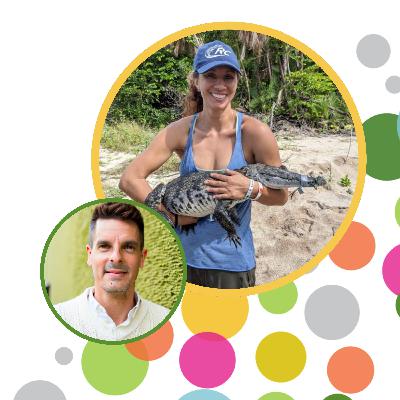
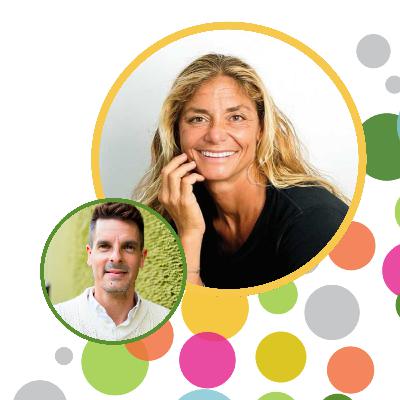


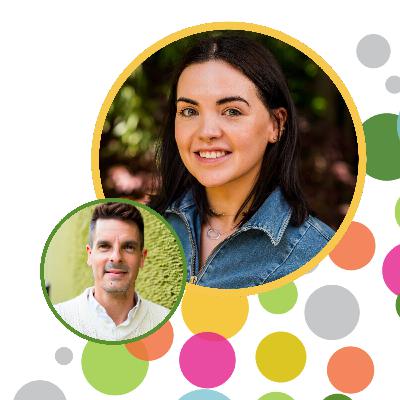


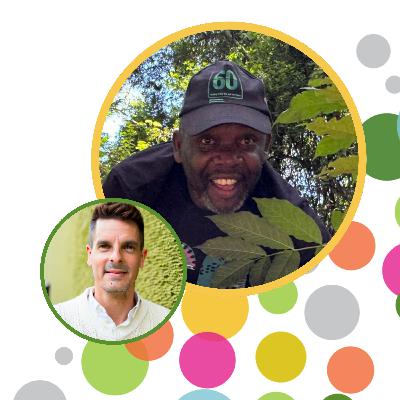
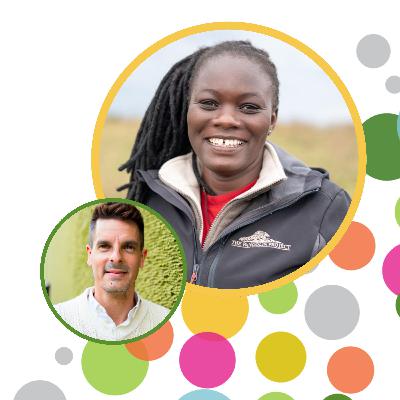
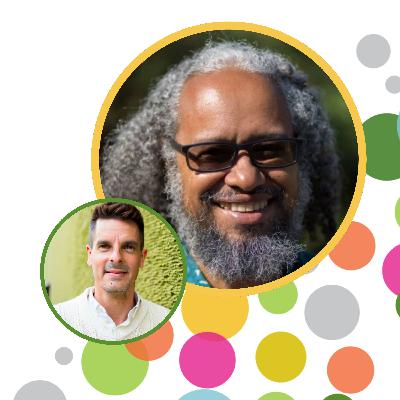

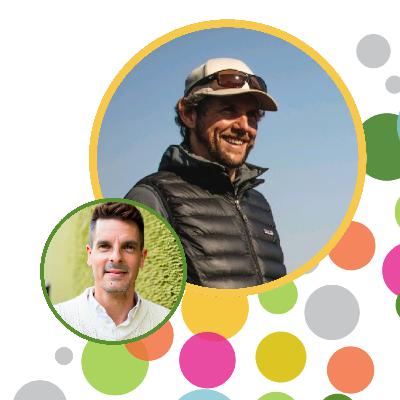
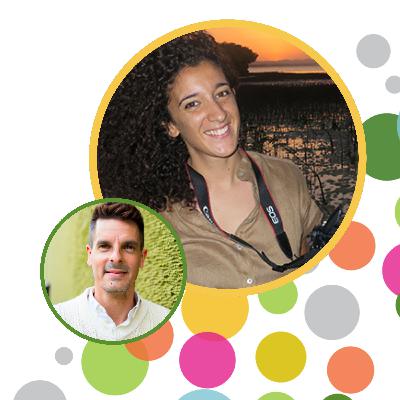

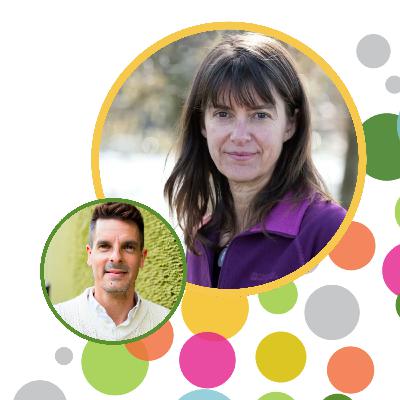








Nice talk! Social enterprises are the answer 🤗
love it